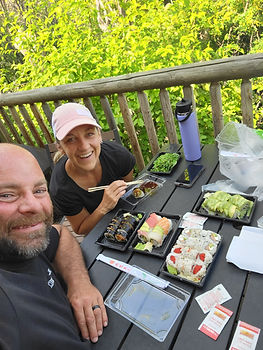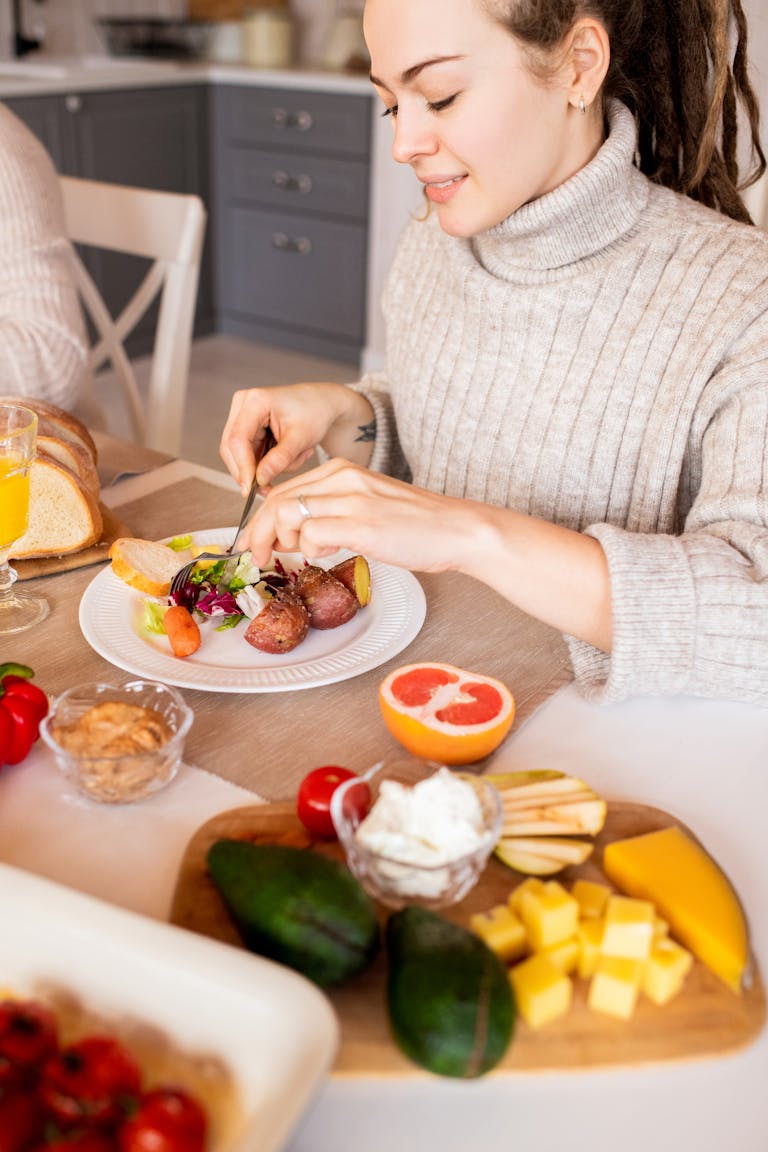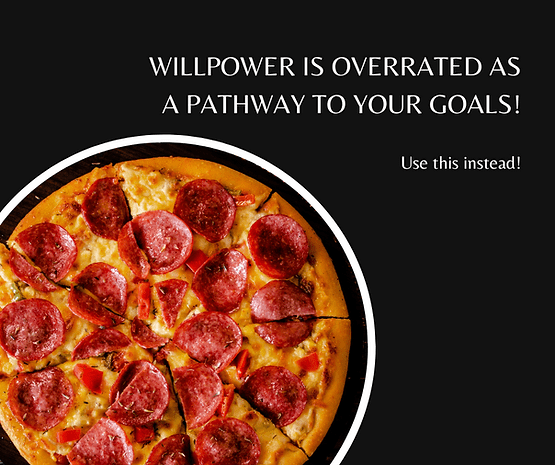Unlocking the Secret: How to Balance Food Freedom and Weight Loss
In a world where fad diets and quick-fix weight loss solutions dominate the market, a delicate balance exists between food freedom and goals related to body composition change. For most of us, this balance can feel like a secret that’s just out of reach. But what if I told you that there is no secret? It’s possible to work toward a healthy relationship with food while simultaneously targeting body composition goals.
It’s important, before we begin, to distinguish between weight loss goals and body composition goals. One relies solely on the scale. The other is concerned with lean mass and prioritizes muscle. Many people would prefer to just focus on weight loss. It is the choice that doesn’t necessarily require as much strategy, however, it’s also not benefiting us in the long-term. Quick-fix weight loss programs don’t “fix” anything. They set one up for muscle loss, rapid regain, and yo-yo dieting.
Balancing food freedom and body composition goals is all about understanding that it’s not an either-or situation, reliant on willpower, which is often what weight loss plans promote. It’s about finding a sustainable approach that allows you to enjoy the foods you love while making conscious choices that support your health and well-being. By shifting your mindset away from restriction and towards nourishment, you can create a positive and empowering relationship with food.
The changes you want to make are all about habits, and habits take time, patience, and practice. Are you ready to take different actions that influence your choices on a larger scale, for the long-term?
Understanding Food Freedom and Body Composition

Food freedom entails embracing a mindset that prioritizes enjoyment, satisfaction, and nourishment, rather than rigid rules and restrictions. It involves developing a positive and intuitive connection with food, allowing oneself to savor a wide variety of foods without guilt or anxiety. Body composition goals ask you to consider the above with the added application of food quality, adequacy at different times, macronutrients, in addition to progressive strength training and the all-important sleep and recovery. By integrating these concepts, we can create a holistic approach that promotes both health and happiness.
There’s no arguing that to change body composition, a shift in how one eats and trains is imperative. If you’re someone who wants to reduce body fat and increase muscle mass, a specific focus is needed. Restricting your calories to lose weight quickly will not net you the effects you desire. And if you’re someone who diets, loses weight, gains it back, then repeats the cycle, each time this happens you are likely dieting with lesser muscle, each subsequent cycle. You may weigh the same on the scale, but your body certainly will not be healthier.
Achieving this delicate equilibrium demands a shift in perspective – moving away from viewing food as the enemy or a mere source of calories, towards recognizing it as a source of pleasure, sustenance, and vitality. By acknowledging that food is not merely fuel for the body but also a source of joy and social connection, you can begin to cultivate a healthier relationship with what you eat. Food serves many purposes, and you get to decide under what circumstances it serves them and to what degree.
It’s worth acknowledging here that our relationship with food is influenced by so many factors, including how we grew up around food, food availability, our ability to acquire certain foods both from economic and environmental standpoints, weight stigma, dieting history, among other variables. For some people, working toward a body composition goal would not be advised if the relationship with food is already significantly compromised and harming physical, mental, and emotional wellbeing.
The Challenges of Balancing Food Freedom and Body Composition Goals
One of the primary hurdles in balancing food freedom and body composition goals stems from the pervasive influence of diet culture. Society bombards us with messages promoting restrictive eating patterns, quick fixes, and unrealistic body ideals, promoting and reinforcing a mindset that equates thinness with worth and moral superiority. This toxic environment can instill feelings of guilt, shame, and inadequacy in individuals who can’t conform to these narrow, unrealistic, and perfectionistic standards. I say the word “can’t” here, but this word makes it sound like it’s a personal deficit when one doesn’t conform. This is not what I mean by any stretch.
There is plenty of evidence which suggests that weight loss maintenance is rare. 95-98% percent of people who lose weight do not maintain that weight loss, and within a few years will gain it back plus some. It’s not a matter of “can’t” because of a lack of skill or strategy or mindset or discipline, which is commonly what we hear in the media. In fact, the body has built-in mechanisms to counter weight loss through hormonal shifts like a decrease in leptin which prompts an increase in hunger, as well as a decrease in metabolism. Increased hunger plus decreased energy expenditure. So…
This is why it’s imperative that any goals set around body composition are done with significant care, reality-checking, and a very long-term focus!
The abundance of conflicting dietary advice, miracle weight loss products, and sensationalized success stories further complicates the journey towards finding a sustainable and balanced approach to food and bodyweight or body composition. As you’ve probably noticed by now, I continue to use the term “body composition” as opposed to “weight loss” or “bodyweight.” While many people have “weight loss” goals, just trying to change the number on the scale can exacerbate the unhealthy adoption of rigid dietary strategies and subsequent disordered eating cycles. Weight loss only goals have a high potential for increasing the pressure to adhere to rigid meal plans, eliminate entire food groups, and constantly monitor caloric intake, which can lead to a disordered relationship with food and a cycle of yo-yo dieting that is both physically and emotionally damaging as mentioned above. So…
This is an important distinction that needed to be illuminated. The term “weight loss” tends to be a catch-all. But it bears repeating that most people, with this as the only concern, without a larger why and deeper perspective around the impact, will not succeed at making the changes they desire.
The Impact of Diet Culture on Food Freedom and Body Composition Goals
Diet culture perpetuates the myth that certain foods are inherently “good” or “bad,” encouraging a dichotomous mindset that categorizes eating behaviors in terms of morality and virtue. This black-and-white mentality not only promotes feelings of guilt and shame surrounding food choices but also overlooks the complex interplay of factors that influence our relationship with eating, such as emotions, cultural influences, and individual preferences.
Furthermore, the relentless pursuit of the elusive ideal body propagated by diet culture can lead to obsessive behaviors, negative self-talk, and a distorted body image. The constant comparison to unattainable standards set by airbrushed celebrities and social media influencers can erode self-esteem and prompt a cycle of self-criticism that undermines efforts towards achieving genuine health and well-being.
The Importance of Finding Balance in Your Approach

Central to the quest for balancing food freedom and body composition goals is the recognition that extremes are seldom sustainable in the long run. If you’re aiming to look like a stage-ready physique competitor all year round, you need to re-evaluate your goals. Rather than oscillating between periods of strict deprivation and indulgence, it is essential to adopt a moderate and flexible approach that allows for enjoyment and spontaneity while also honoring your health goals. This entails cultivating a sense of mindfulness and self-awareness around eating habits, learning to tune into hunger and satiety cues, and making choices that align with your values and preferences.
It also means honoring that the body will change. It evolves. At different times and seasons in your life, it is normal and natural to see shifts. For example, in the summer, I tend to lose a little body fat because I’m more active. I am outside more, riding my bike. In the winter, when it’s cold, I move less. I literally hunker down more. And in turn, I am a little heavier.
My hunger changes as well based on the season I’m in, and based on my menstrual cycle! In my work with clients, we’re often discussing the different types of hunger and how to open to all of them. For example, if you’re an athlete, intense exercise will often blunt your appetite, at least for a specific period of time. Despite the feeling of not wanting to eat, it’s important to continue fueling in certain situations. Some of my clients are also not hungry in the morning, and this is when they workout. We work together to find options that will work best for them based on their circumstances.
By striking a balance between nourishing your body with wholesome foods and savoring indulgences in moderation, you can foster a healthy and sustainable relationship with food that supports your overall well-being. I like to take an 80-20 approach. Please don’t read that and try to make it black and white. This is not a perfect science! But embracing a flexible mindset that acknowledges the ebb and flow of life– including celebrations, social gatherings, and unexpected cravings– can help you navigate the complexities of food choices with greater ease and confidence.
For example, if you’re someone who is committed to changing habits related to nutrition to support a different lifestyle, but you are an everyday drinker, I wouldn’t tell you to completely stop consuming alcohol. Of course, if that was your prerogative, I also wouldn’t discourage it. Alcohol has zero benefits to your health. But instead, in an effort to support your recognition of the many ways alcohol affects you, I’d ask you to choose a reasonable shift and then start to note how it impacts your sleep, your overall energy levels, your workouts, your cognition, your food choices, etc. All the things that will make a significant difference overall in your life.
Strategies for Incorporating Food Freedom into Your Body Composition Goals
Integrating food freedom into body composition goals involves adopting a holistic approach that considers not only the quantity and quality of food consumed but also the emotional, social, and environmental factors that influence eating behaviors. Rather than fixating solely on the number on the scale, it is crucial to focus on nourishing your body with nutrient-dense foods that support energy levels, cognitive function, and overall vitality.
One effective strategy for embracing food freedom while pursuing body composition goals is practicing mindful eating. This involves paying attention to the sensory experience of eating, such as the flavors, textures, and aromas of food, as well as tuning into your body’s hunger and fullness signals. Again, not a perfect science, and I’ve had many clients who decide they want to be an “intuitive eater” but make this another diet whereby hunger and fullness are black and white. It’s no surprise that they end up feeling out of control because they can’t “figure it out.” But by incorporating mindfulness into our eating, we learn to slow down when we eat, savor each bite, and practice being present in the moment. In doing so, we can enhance enjoyment of meals, improve digestion, and cultivate a greater sense of satisfaction.
Mindful Eating and Intuitive Eating Practices
In addition to mindful eating, another valuable tool in combining food freedom and body composition goals is intuitive eating. This approach encourages individuals to trust their body’s innate wisdom when it comes to hunger, fullness, and food preferences, rather than relying on rigid external rules or guidelines. By listening to your body’s signals and honoring its cues, you can develop a more harmonious relationship with food, free from the constraints of dieting mentality.
Intuitive eating involves rejecting the diet mentality, making peace with food, and challenging the food police – those internalized voices that dictate what, when, and how much you should eat. By giving yourself unconditional permission to eat all foods without judgment, you can break free from the cycle of restriction and deprivation that often characterizes traditional weight loss approaches. This liberation allows you to enjoy a diverse range of foods while also respecting your body’s unique needs and preferences.
As a certified intuitive eating counselor, I should add that most people (and I fell into this camp at one point in both my professional and personal journey) believe having goals for body composition and intuitive eating are mutually exclusive. And honestly, the creators of the “method” would say they are. I believe we can combine all different ideas and methods, strategies, and tools for our benefit though.
Just like I’m not just a CBT therapist. I practice this method with my clients, but I also use somatic interventions, IFS, ACT, and a whole host of others that are effective for different situations! Intuition is not “do whatever, whenever” or just “follow your desires.” Intuition is actually a combination of intellectual intelligence (i.e. in this case, understanding macronutrients and how they function in your body), interoceptive awareness (i.e., how your unique body and system is affected by different foods at different times), and emotions (i.e., how you feel for any number of reasons about eating or food due to cultural, familial, or other connections).
The Role of Exercise in Balancing Food Freedom and Body Composition Goals
While food choices play a significant role in achieving body composition goals, physical activity is equally crucial in supporting overall health and well-being. Your choice of exercise can serve many purposes. You might have a goal of building or maintaining muscle; building or maintaining bone density; increasing flexibility, mobility, or functionality; increasing strength; or increasing endurance. But exercise also enhances mood, reduces stress, boosts metabolism, can add to your sense of connection, has the often-added benefit of helping you choose your nutrition more wisely, and shift body image in a positive direction without any change in your actual appearance! Finding an enjoyable form of movement that fits your lifestyle and preferences is key to establishing a sustainable exercise routine that complements your food freedom journey.
Rather than viewing exercise as a punishment for indulging in certain foods or as a means to “earn” your meals, it is essential to reframe physical activity as a form of self-care and self-expression. Engaging in activities that bring you joy, whether it’s weightlifting, CrossFit, cycling, dancing, hiking, yoga, or team sports, can help you cultivate a positive relationship with movement and promote a sense of balance and vitality in your life. And let’s not discount how this vitality can positively impact your relationship with yourself, building confidence, resilience, and grit!
Overcoming Guilt and Shame around Food Choices
Guilt and shame are common emotions that arise in the context of food choices, particularly when individuals perceive themselves as deviating from strict dietary guidelines or succumbing to cravings. However, it is essential to recognize that these feelings are not inherent to food itself but are often rooted in deeper beliefs and narratives around worthiness, control, and self-image.
One powerful way to overcome guilt and shame around food choices is through self-compassion. By treating yourself with the same kindness and understanding that you would offer to a friend facing similar struggles, you can cultivate a sense of acceptance and forgiveness towards your perceived “mistakes.” Rather than berating yourself for perceived slip-ups or lapses in willpower, acknowledge that you are human, capable of learning and growing from every experience.
In a recent group coaching call for my Food & Body Freedom Experience clients, we discussed the concept of self-compassion and how it’s useful in building resilience as we work toward changing our habits and building consistent actions that will make a different long-term. I hear all the time how self-compassion feels hard initially. Many of us live with the idea that in order to succeed, we need to be hard on ourselves. We also may have grown up with caregivers who shamed us when we made mistakes or acted in a way they disapproved of. So we learned that shame was a viable method of behavioral control. And it is. Except in the long-term it doesn’t build up our motivation and confidence– it breaks it. Self-compassion moves us into a more expansive, exploratory, curious state that allows for greater problem-solving, solution-building, and a growth mindset.
Seeking Support and Accountability in Your Journey
It’s no surprise that balancing food freedom and body composition goals can be challenging, especially in a culture that often promotes individualism and self-reliance. Seeking support and accountability from trusted professionals is important, as they can guide you appropriately and provide invaluable encouragement and perspective as you navigate the complexities of changing your relationship with food and your body. Likewise, being a part of a community of like-minded individuals who share similar goals and values can offer a sense of camaraderie, motivation, and inspiration to stay committed to your path.
Conclusion
Balancing food freedom and body composition goals involves embracing a mindset that prioritizes intelligence, nourishment, pleasure, and self-care over rigid rules and restrictions. By understanding the impact of diet culture, cultivating mindfulness around eating habits, and seeking support from others, you can aim for a healthier and more harmonious relationship with food while still working towards your body composition goals.
Remember, it’s not about perfection or adhering to a strict set of rules; it’s about finding a sustainable and fulfilling approach that honors your body’s needs and preferences. This is a skill that takes time to learn. Listening to your body, trusting your intuition, and approaching food with curiosity and compassion while integrating nutritional knowledge is not something many of us know how to do, nor is it a perfect science. But when you are willing and give yourself the opportunity to grow into this approach, you pave the way for a lifetime of health, joy, and vitality.
Looking for more support?
- Check out The Confident Coping Without Food System, your go-to source for food & body freedom! A 16-week online program with a built-in support community and weekly check-ins with Dr. Kori, designed to liberate you from chronic dieting and restriction, compulsive eating, and body shame. Finally understand how to manage your emotions and make peace with food and your body.
- End Emotional Eating & Change Your Relationship with Food, has over 400 students who have rated it with 5-stars! Jam-packed with resources to support your development the skills necessary for navigating the emotions that cause you to eat when you’re not hungry!
- Interested in one-on-one support? Learn more about my Liberated Life & Nutrition and Lifestyle Live Coaching Options.
- Click here to subscribe to my newsletter for tools and strategies for living your YOUR healthiest life!
- Fighting through the menopause transition and finding it’s taking a toll on your relationship with food and body? Join the Rise & Shine Menopower facebook group! Get support and feel resourced!






